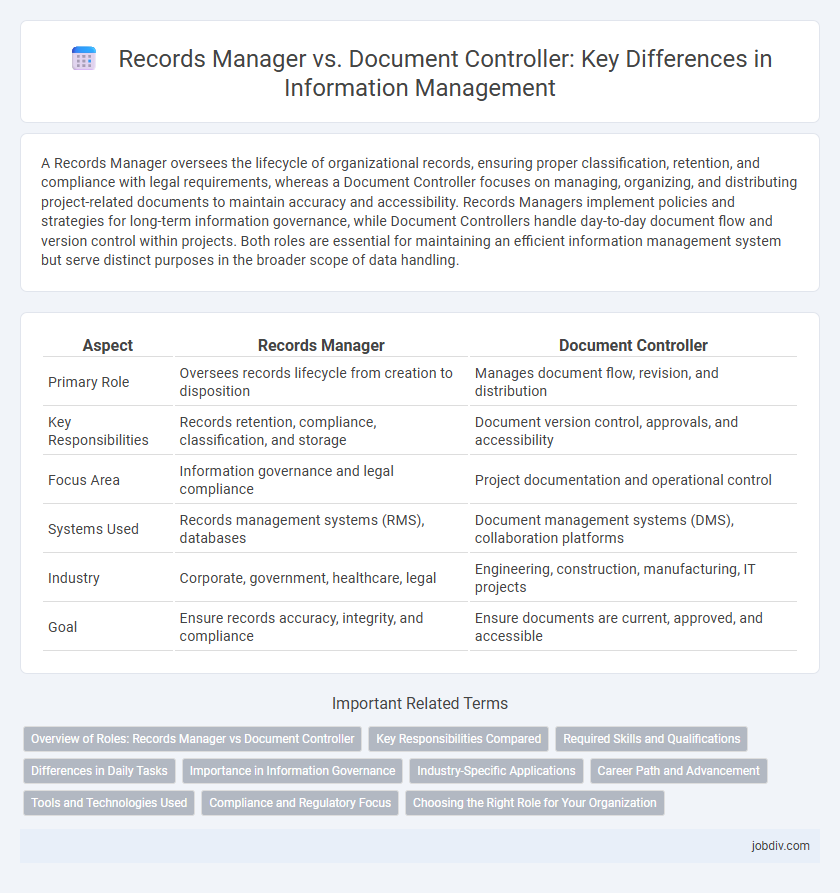A Records Manager oversees the lifecycle of organizational records, ensuring proper classification, retention, and compliance with legal requirements, whereas a Document Controller focuses on managing, organizing, and distributing project-related documents to maintain accuracy and accessibility. Records Managers implement policies and strategies for long-term information governance, while Document Controllers handle day-to-day document flow and version control within projects. Both roles are essential for maintaining an efficient information management system but serve distinct purposes in the broader scope of data handling.
Table of Comparison
| Aspect | Records Manager | Document Controller |
|---|---|---|
| Primary Role | Oversees records lifecycle from creation to disposition | Manages document flow, revision, and distribution |
| Key Responsibilities | Records retention, compliance, classification, and storage | Document version control, approvals, and accessibility |
| Focus Area | Information governance and legal compliance | Project documentation and operational control |
| Systems Used | Records management systems (RMS), databases | Document management systems (DMS), collaboration platforms |
| Industry | Corporate, government, healthcare, legal | Engineering, construction, manufacturing, IT projects |
| Goal | Ensure records accuracy, integrity, and compliance | Ensure documents are current, approved, and accessible |
Overview of Roles: Records Manager vs Document Controller
A Records Manager oversees the systematic control of records throughout their lifecycle, ensuring proper classification, storage, retrieval, and compliance with legal and regulatory requirements. A Document Controller focuses on organizing, distributing, and archiving project-specific documents, maintaining version control, and supporting project teams with accurate documentation. While both roles emphasize document management, the Records Manager has a broader responsibility for organizational records governance, whereas the Document Controller supports operational workflows within projects.
Key Responsibilities Compared
Records Managers oversee the lifecycle of organizational records, ensuring proper classification, retention, and compliance with legal requirements. Document Controllers focus on managing the flow, storage, and accessibility of project-related documents to maintain accuracy and version control. Key responsibilities for Records Managers include policy development and audit management, while Document Controllers prioritize document distribution and coordination among project teams.
Required Skills and Qualifications
Records managers require expertise in information governance, compliance standards, and advanced knowledge of records management systems, often holding certifications like CRM (Certified Records Manager). Document controllers need proficiency in document control software, attention to detail, and understanding of project documentation requirements, with qualifications including experience in administrative or project coordination roles. Both roles demand strong organizational skills, familiarity with regulatory frameworks, and the ability to maintain accuracy and confidentiality in handling information.
Differences in Daily Tasks
Records Managers focus on organizing, maintaining, and securing records throughout their lifecycle, ensuring compliance with legal and regulatory requirements. Document Controllers primarily handle the distribution, revision tracking, and storage of project-related documents to support team collaboration and workflows. While Records Managers emphasize long-term record retention and retrieval, Document Controllers concentrate on maintaining up-to-date and accessible documentation during active project phases.
Importance in Information Governance
Records Managers ensure proper classification, retention, and disposal of information assets, which is crucial for compliance with data protection laws and regulatory requirements. Document Controllers maintain accurate, up-to-date documentation and version control, supporting operational efficiency and reducing risks of information mismanagement. Effective collaboration between Records Managers and Document Controllers strengthens overall information governance by safeguarding data integrity and accessibility.
Industry-Specific Applications
Records Managers specialize in overseeing the lifecycle of records within industries such as healthcare, legal, and finance, ensuring compliance with regulatory standards like HIPAA and Sarbanes-Oxley. Document Controllers focus on managing technical documents and drawings primarily in construction, engineering, and manufacturing sectors, facilitating version control and project documentation accuracy. Both roles leverage industry-specific software solutions, including electronic document management systems (EDMS) and compliance tracking tools, tailored to their operational environments.
Career Path and Advancement
Records Managers typically advance by developing expertise in information governance, compliance, and data management, often progressing to roles such as Information Governance Manager or Compliance Director. Document Controllers focus on mastering document control systems and project-specific documentation requirements, with career progression moving toward positions like Document Control Supervisor or Quality Assurance Manager. Both career paths offer opportunities for specialization in digital records management and regulatory standards, enhancing potential for leadership roles in information management.
Tools and Technologies Used
Records Managers primarily utilize electronic records management systems (ERMS) such as IBM FileNet and OpenText to ensure compliance and lifecycle management, while Document Controllers depend on document control software like Aconex and Autodesk Docs for version control and project collaboration. Advanced tools like SharePoint and Microsoft 365 are common across both roles for centralized access and secure storage. Automation technologies, including AI-powered tagging and metadata extraction, enhance efficiency in managing vast datasets and documentation workflows.
Compliance and Regulatory Focus
Records Managers ensure compliance by implementing systematic policies for retention, protection, and legal adherence to regulatory standards like GDPR and HIPAA. Document Controllers focus on organizing and controlling document versions, ensuring audit trails and access controls align with industry-specific regulations such as ISO 9001. Both roles collaborate to maintain data integrity and meet regulatory requirements, minimizing legal risks and ensuring organizational accountability.
Choosing the Right Role for Your Organization
Selecting the right role between a Records Manager and a Document Controller depends on your organization's needs for information governance and operational efficiency. Records Managers specialize in the strategic oversight of record lifecycle, compliance, and retention policies, ensuring regulatory adherence and secure archiving. Document Controllers focus on organizing, tracking, and controlling document flow within projects, emphasizing version control and accessibility for active documentation management.
Records Manager vs Document Controller Infographic

 jobdiv.com
jobdiv.com